By JULIE MINDA
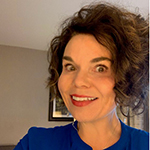
Betts
Several months after Becky Betts began establishing a population health department for Providence St. Joseph Health's southeast Washington region, the pandemic exploded in and around Walla Walla, Washington. Particularly hard hit was the large migrant population working the region's fields and meat processing plant.
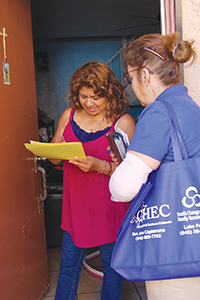
Community health worker Soledad Gomez, right, leaves behind information at a home in San Juan Capistrano, California, on services and programs offered by family resource centers run by Providence St. Joseph Health's Providence Mission Hospital. This visit took place pre-pandemic, in October 2019. Several months later, in response to COVID-19, the hospital's community health workers shifted their focus to migrant worker communities where they share guidance about the virus and vaccines.
Betts says while 11 languages are spoken at the plant, the largest cohort of workers is Latino — a community that registered a distressingly high COVID-19 infection rate.
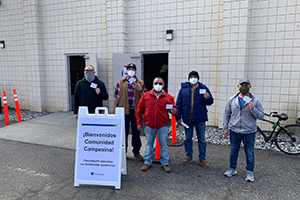
To encourage widespread vaccination, leaders of the farmworker community in Bellingham, Washington, display their vaccination cards after exiting a vaccine clinic. Community to Community Development shared this photo over social media and it made the front page of a local newspaper.
Betts and the two community health workers she'd just hired spoke only English. They spent hours calling all patients who were awaiting the results of a COVID-19 test to help them better understand the disease. With Latinos accounting for the vast majority of COVID patients on ventilators at Providence St. Mary Medical Center, Betts convened a committee whose members were part of Latino and migrant groups and asked participants what Providence should be doing to raise health literacy and reduce COVID transmission in the Latino population.
"They told us, they don't want glossy brochures — they don't read them — and they said we can't reach them through our normal channels," she said. "They said they need (to hear information from) a trusted voice or the message falls flat."
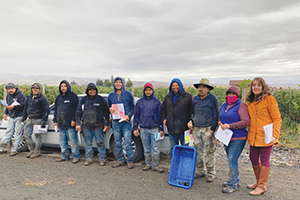
Health promotora Maria Remington, far right, distributes educational materials on heart health to seasonal vineyard workers in the Walla Walla, Washington, region. Providence St. Joseph Health covers part of Remington's salary.
On the committee's advice, the population health team began distributing public health information in Spanish through Spanish-language publications, radio and texting platforms, as well as through grocers and churches in the Hispanic community. Betts hired a Spanish-speaking community health worker and partnered with a local winery to pay the salary of a second Spanish-speaking community health worker who reaches out not only to vineyard workers but also to others in the migrant community, as well as to Latino neighborhoods in Providence's service area.
The quartet of community health workers immersed themselves in the migrant worker communities and other vulnerable communities and set to work dispelling COVID myths, spreading reliable information about the virus and infection prevention and helping people get tested for coronavirus. The trust they built put them in good standing to promote vaccination in 2021, including at mobile vaccination sites.
Front line of public health
Catholic Health World spoke with several ministry members who have asked their community health workers to take on expanded roles related to COVID education and mitigation. These community health workers have leveraged their strong suit: using their credibility as influential members of cultures or ethnic groups that distrust health care providers to change hearts and minds and connect the vulnerable to services.
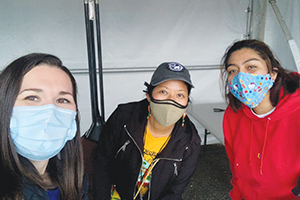
Employees of PeaceHealth and health promotores from its partner Community to Community Development staff a popup COVID-19 vaccine clinic in Bellingham, Washington, in March 2021. At left is Rachel Lucy, community health director for PeaceHealth in the Pacific Northwest, and in the middle is Australia Tobon, a Community to Community promotora.
Community health worker has evolved into a catchall category of sorts. It takes in volunteers and people who are employed by hospitals and health systems, nonprofit agencies and government and public health offices. They are frontline public health workers, who bring various education levels and backgrounds to their jobs. Many are drawn from the community and culture of the folks they are attempting to influence and educate. Literally and figuratively, they speak their language.
MHP Salud, a nonprofit that promotes the community health worker model, says it was used in Latin America, where the role is called promotores de salud, before being introduced in the U.S. in the 1960s. There are community health workers in all 50 states and the District of Columbia, and in countries around the world.
During the pandemic, many Catholic health systems are using community health workers — either on a paid or voluntary basis — as part of their directed outreach to vulnerable and vaccine-hesitant populations.
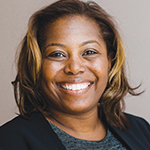
Webb
Mercy of St. Louis is among those using community health workers to provide COVID education to some of its high-risk communities. Dara Webb, Mercy executive director of care management and quality, says it is important to many people in minority communities that community health workers "look like them, can relate to them and are culturally competent."
Mercy's staff of 10 employed community health workers in the greater St. Louis region — four of them are Black, and six are white — hold bachelor's degrees and/or have experience in public health, health education, social work and similar fields. Mercy embeds five of its St. Louis-area community health workers in its emergency departments and five in its clinics. Prior to the pandemic, they focused on coordinating patients' care and connecting patients with socioeconomic support programs.
Mercy has used community health workers for outreach to vaccine-hesitant, Black residents of Meacham Park and Ferguson — communities with low levels of trust in institutions and a lot of vaccine resistance. A large number of homes in Meacham Park, a Black neighborhood in a predominantly white suburb, were demolished more than a decade ago to make room for a big-box shopping center. The police killing of the unarmed Black teenager Michael Brown in Ferguson in 2014 sparked protests that propelled the Black Lives Matter movement.
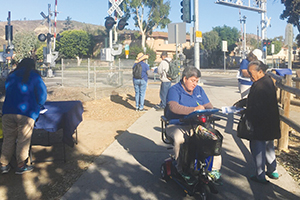
In February 2020, Maria Guadalupe Madrigal, at left in foreground, and other community health workers provide information to passersby in San Juan Capistrano, California, on programs and services of family resource centers run by Providence St. Joseph Health's Providence Mission Hospital. As a pandemic precaution, these workers shifted from in-person to virtual outreach in spring 2020.
To reach the vaccine hesitant in these communities and elsewhere, Mercy community health workers continue to make presentations at local venues and go door to door to talk with people about their perspectives on COVID.
The workers dispel myths community members may have picked up on social media or other channels, says Webb.
Online and door-to-door
Community health workers at Providence Mission Hospital in Mission Viejo, California, either assist patients with care and social service coordination or do outreach and education to vulnerable populations. Most of the health advocates in the latter group speak Spanish and either hail from medically underserved, predominantly Hispanic communities or are attuned to the culture of those communities.
Mission Hospital also contracts with Latino Health Access to use its health promotores.
Christy Cornwall, director of community benefit for Mission Hospital, says that before the pandemic the hospital's health advocates and Latino Health Access employees regularly canvassed low-income, immigrant communities to talk to residents about how to access health care and social services and to explain the importance of participating in the census.
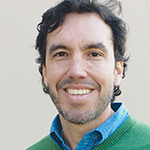
Moreno Cerezo
Eduardo Moreno Cerezo, Mission Hospital healthy communities manager, says because of infection transmission risks — the Latino communities were hard hit by coronavirus — members of the health advocate team he leads initially had to stop their in-person outreach and provide public health information by phone and social media.
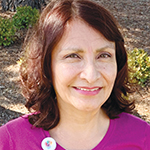
Sanchez
Mission Hospital health advocates Jenny Sanchez and Rocio Telumbre say once team members were vaccinated and community infection rates came down they resumed door-to-door outreach and in-person pitches at community forums where they encourage vaccination.
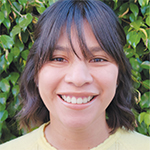
Telumbre
When vaccine uptake continued to disappoint, Mission Hospital convened focus groups to find out why. Participants said they did not trust the health system or the government. Those who were undocumented feared the government would trace them if they filled out vaccination forms. Some had wanted to get vaccinated but were working during clinic hours. Some couldn't use a computer to register for a shot. Others lacked transportation to get to the clinics.
The health advocates used the input to tailor vaccine dispensing site protocols and access to meet community members' needs.
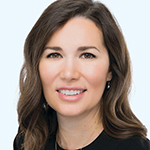
Lucy
Blind spots
In the Pacific Northwest PeaceHealth has long involved community health workers in patient care coordination, but it wasn't until COVID struck that its hospitals in northwest Washington ramped up efforts with community health workers specializing in community outreach, says Rachel Lucy, that region's community health director.
Early in the pandemic, PeaceHealth recognized that not everyone was getting access to health information and testing and supplies for COVID prevention. "What we learned," says Lucy, "was that we had a number of blind spots in health access, and we took this crisis as an awakening."
The blind spots were in predominantly Hispanic migrant agricultural worker communities and other minority populations that experienced higher rates of COVID infection and worse COVID outcomes than the white population did.
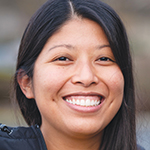
Tobon
PeaceHealth responded by partnering with Community to Community Development. That Bellingham, Washington-based organization engages promotoras, volunteers and others to advocate for the rights of vulnerable groups, especially agricultural workers. Australia Tobon, a Community to Community promotora, says while her organization has deep connections with the agricultural workers and other migrant laborers, it lacked the medical expertise and resources to get them COVID information, protective equipment for those working in food processing plants and convenient access to vaccines.
The partnership forged early this year relied on Community to Community promotoras to get out information to the agricultural workers and other vulnerable minority groups; PeaceHealth administered the vaccinations. Leaders in the farmworker community got vaccinated early and taped pro-vaccination testimonials for social media to encourage their fellow workers to get immunized.
PeaceHealth set up dedicated clinics at times that were convenient to the agricultural workers. Promotoras led the outreach and scheduling, and they accompanied people coming for vaccines. Sometime later, public health agencies and federally qualified health clinics further expanded vaccine access to agricultural workers through mobile health clinics.
PeaceHealth compiled video testimonials of employees and provided resources to North Sound Accountable Communities of Health to record pro-vaccine messages from young adults who are trusted members of minority communities in southwest Washington. Other non-profit organizations with immigrant or refugee constituencies are promoting the videos, which encourage vaccine-resistant individuals to get inoculated. The North Sound organization’s website hosts vaccine testimonials in seven languages.
View video